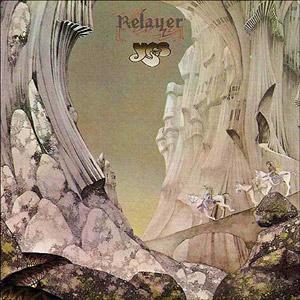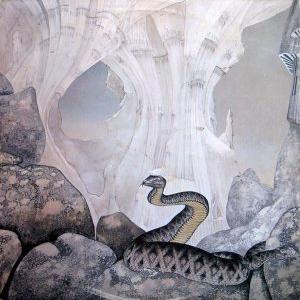Relayer
by Yes


Artist:
Yes
Label:
Atlantic
Catalog#:
SD 18122
Format:
Vinyl
Country:
United States
Released:
1974-11
| Tracklist | |||
| A | The Gates Of Delirium | 21:55 | |
| B1 | Sound Chaser | 9:25 | |
| B2 | To Be Over | 9:08 | |
Credits
Artwork – Roger Dean (4)
Composed By, Written-By, Arranged By – Yes
Performer – Alan White, Chris Squire, Jon Anderson, Patrick Moraz, Steve Howe
Photography By – Jean Ristori
Producer – Eddy Offord, Yes
Notes
Recorded on Eddie Offord's mobile equipment in England during the late summer and autumn 1974
℗ 1974 Atlantic
Strawberry Bricks Entry:
Following Rick Wakeman's abrupt departure, Yes set out to find a replacement for him. Short-listed was Nick Glennie-Smith (Wally), Jean Roussel (Cat Stevens) and Greek keyboard wizard Vangelis, but the band accepted Swiss-born Patrick Moraz instead. The classically-trained Moraz had been in Mainhorse in the early 70s; and more recently, played in Refugee. The band retired to bassist Chris Squire's home, where he had recently finished building a recording studio. The result, in some ways, was Yes' most un-Yes like recording to date. If Tales From Topographic Oceans suffered from sprawl, Relayer is the exact opposite. The album is dense and more complex; and, courtesy of Moraz's various keyboards, offers a new tonality from the band's previous works. The album's centerpiece, "The Gates of Delirium," is another epic from Jon Anderson, this time inspired by Tolstoy's War and Peace. GoD packs in enough drama for an entire album; but sensibly, Yes attempt to cut it down to size—to half the record, that is. The track opens meekly; but once things get started, the Squire and Alan White rhythm team switch into overdrive, providing one heavy foundation throughout. Halfway through the track, the band explodes into an instrumental foray that owes more to fusion than to prog rock. But true to form, the track resolves into Anderson's gentle ballad "Soon," a song he would reprise for decades. One gets the feeling that "Sound Chaser" is going to be another new monster piece of Yes music, but it's mostly a showcase for Steve Howe's prowess on the Telecaster. "To Be Over," however, is the album's gem. As the playful counterpoint gently unfolds into the main theme, Howe's guitar once again leads the song through its powerful symphonic refrain. The album fared well on the charts, breaking the Top 5 on both sides of the Atlantic. After a tour of the US in support of the record, Yes splintered and, in perhaps their most pretentious act, each individual member went on to record a solo album. The band reconvened in 1976 for further stadium-filling tours; however, by the end of the year, they were in Switzerland, ready to record a new album.

